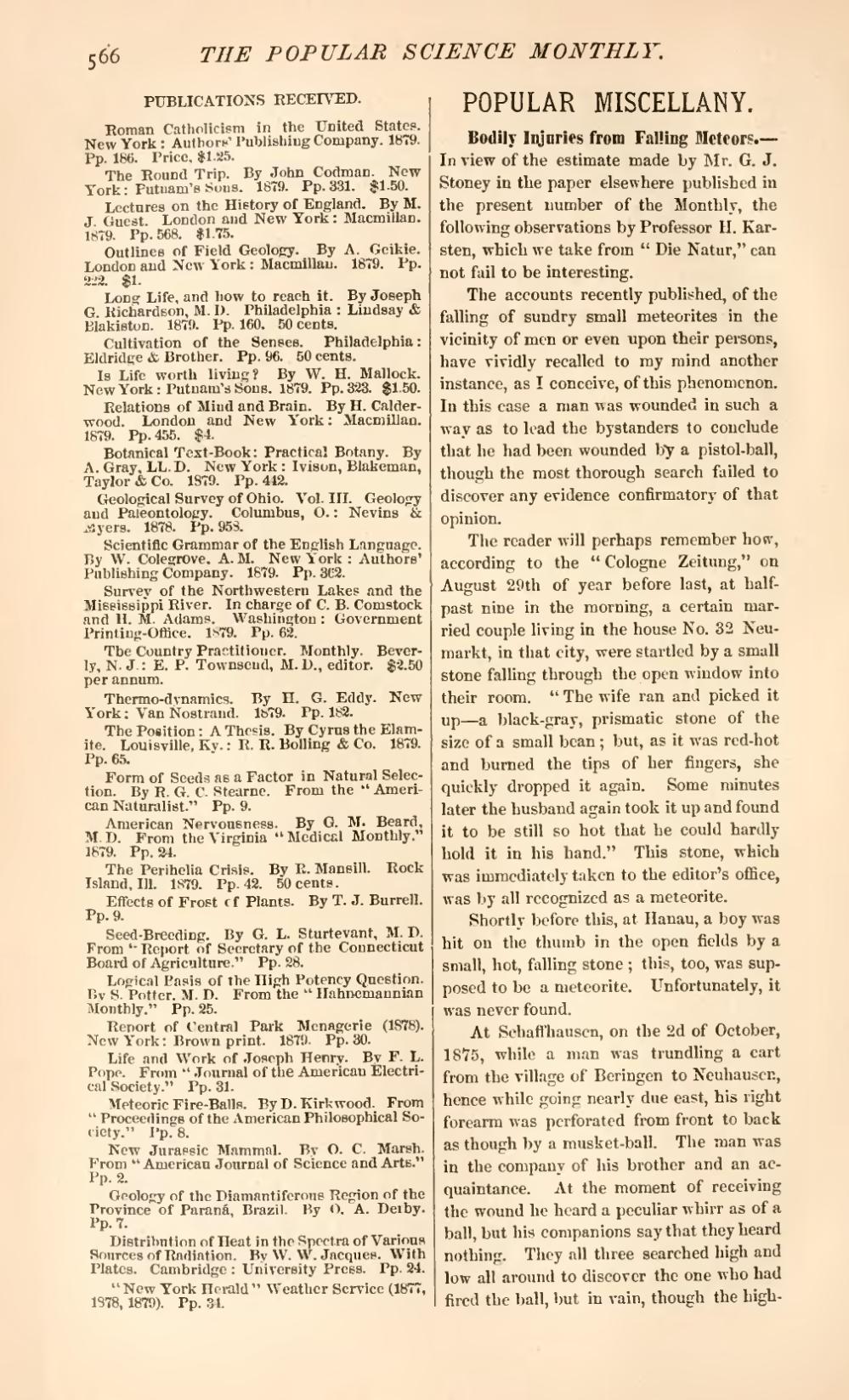Roman Catholicism in the United State?. New York: Authors' Publishing Company. 1879. Pp. 186. Price, $1.25.
The Round Trip. By John Codman. New York: Putnam's Sons. 1879. Pp. 331. $1.50.
Lectures on the History of England. By M. J Guest. London and New York: Macmillan. 1879. Pp. 568. $1.75.
Outlines of Field Geology. By A. Geikie. London and New York: Macmillan. 1879. Pp. 222. $1.
Long Life, and how to reach it. By Joseph G. Richardson, M.D. Philadelphia: Lindsay & Blakiston. 1879. Pp. 160. 50 cents.
Cultivation of the Senses. Philadelphia: Eldridge & Brother. Pp. 96. 50 cents.
Is Life worth living? By W. H. Mallock. New York: Putnam's Sons. 1879. Pp. 323. $1.50.
Relations of Mind and Brain. By H. Calderwood. London and New York: Macmillan. 1879. Pp. 455. $4.
Botanical Text-Book: Practical Botany. By A. Gray, LL.D. New York: Ivison, Blakeman, Taylor & Co. 1879. Pp. 442.
Geological Survey of Ohio. Vol. III. Geology and Paleontology. Columbus, O.: Nevins & flyers. 1878. Pp. 953.
Scientific Grammar of the English Language. By W. Colegrove. A.M. New York: Authors' Publishing Company. 1879. Pp. 362.
Survey of the Northwestern Lakes and the Mississippi River. In charge of C. B. Comstock and H. M. Adams. Washington: Government Printing-Office. 1879. Pp. 62.
The Country Practitioner. Monthly. Beverly, N.J.: E. P. Townsend, M.D., editor. $2.50 per annum.
Thermodynamics. By H. G. Eddy. New York: Van Nostrand. 1679. Pp. 182.
The Position: A Thesis. By Cyrus the Elamite. Louisville, Ky.: R. R. Boiling & Co. 1879. Pp. 65.
Form of Seeds as a Factor in Natural Selection. By R. G. C. Stearne. From the "American Naturalist." Pp. 9.
American Nervousness. By G. M. Beard, M.D. From the Virginia "Medical Monthly." 1879. Pp. 24.
The Perihelia Crisis. By R. Mansill. Rock Island, 111. 1879. Pp. 42. 50 cents.
Effects of Frost of Plants. By T. J. Burrell. Pp. 9.
Seed-Breeding. By G. L. Sturtevant, M.D. From "Report of Secretary of the Connecticut Board of Agriculture." Pp. 28.
Logical Basis of the High Potency Question. By S. Potter. M.D. From the "Hahnemannian Monthly." Pp. 25.
Report of Central Park Menagerie (1878). New York: Brown print. 1879. Pp. 30.
Life and Work of Joseph Henry. By F. L. Pope. From "Journal of the American Electrical Society." Pp. 31.
Meteoric Fire-Balls. By D. Kirkwood. From "Proceedings of the American Philosophical Society." Pp. 8.
New Jurassic Mammal. By O. C. Marsh. From "American Journal of Science and Arts." Pp. 2.
Geology of the Diamantiferous Region of the Province of Paraná, Brazil. By O. A. Derby. Pp. 7.
Distribution of neat in the Spectra of Various Sources of Radiation. By W. W. Jacques. With Plates. Cambridge: University Press. Pp. 24.
"New York Herald" Weather Service (1877, 1978, 1879). Pp. 34.
POPULAR MISCELLANY.
Bodily Injuries from Falling Meteors.—In view of the estimate made by Mr. G. J. Stoney in the paper elsewhere published in the present number of the Monthly, the following observations by Professor H. Karsten, which we take from "Die Natur," can not fail to be interesting.
The accounts recently published, of the falling of sundry small meteorites in the vicinity of men or even upon their persons, have vividly recalled to my mind another instance, as I conceive, of this phenomenon. In this case a man was wounded in such a way as to lead the bystanders to conclude that he had been wounded by a pistol-ball, though the most thorough search failed to discover any evidence confirmatory of that opinion.
The reader will perhaps remember how, according to the "Cologne Zeitung," on August 29th of year before last, at half-past nine in the morning, a certain married couple living in the house No. 32 Neumarkt, in that city, were startled by a small stone falling through the open window into their room. "The wife ran and picked it up—a black-gray, prismatic stone of the size of a small bean; but, as it was red-hot and burned the tips of her fingers, she quickly dropped it again. Some minutes later the husband again took it up and found it to be still so hot that he could hardly hold it in his hand." This stone, which was immediately taken to the editor's office, was by all recognized as a meteorite.
Shortly before this, at Hanau, a boy was hit on the thumb in the open fields by a small, hot, falling stone; this, too, was supposed to be a meteorite. Unfortunately, it was never found.
At Schaffhausen, on the 2d of October, 1875, while a man was trundling a cart from the village of Beringen to Neuhausen, hence while going nearly due east, his right forearm was perforated from front to back as though by a musket-ball. The man was in the company of his brother and an acquaintance. At the moment of receiving the wound he heard a peculiar whirr as of a ball, but his companions say that they heard nothing. They all three searched high and low all around to discover the one who had fired the ball, but in vain, though the high-

